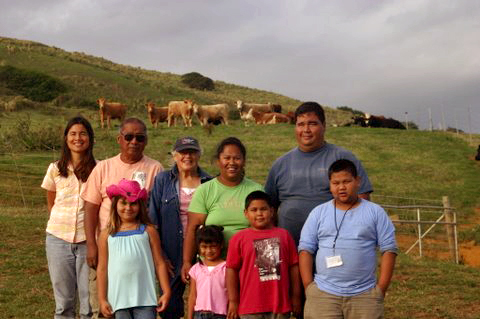Richard told me he is very impressed with what Michelle Galimba and her family are doing in Ka‘u, and so I thought I’d give her a call and learn a little more.
 Michelle (left) and her family
Michelle (left) and her family
I learned that Michelle grew up on dairy farms in Ka‘u and then lived in Haleiwa on O‘ahu, where her dad worked for Meadow Gold Dairies. These days, she and her family own and run a cattle ranch in Na‘alehu.“There’s a little bit of irony in the name,” she told me about their Kuahiwi Ranch. “Kuahiwi means ‘mountain,’ but the other meaning is ‘back country,’ like ‘the sticks.’”
To some people, Ka‘u has that sort of back country reputation. Michelle says she thinks people in Ka‘u are starting to rethink values, though, such as of its traditional culture, and that the lifestyle of Ka‘u is becoming more and more relevant.
“If we can find success stories for people in Ka‘u,” she says, “I think that goes a long way in changing other people’s perceptions and also our own, for ourselves.”
She mentions the coffee industry that’s recently sprung up in Ka‘u. “My friend Chris [Manfredi] started talking with the coffee farmers and thought their coffee was really good. He entered it into this international competition and it did really, really well. People were just so thrilled.”
She is one of the organizers of this year’s Ka‘u Coffee Festival, which will be May 1st and 2nd.
“There’s starting to be a stable of agriculture products in Ka‘u that are premium and interesting and something people can be proud of,” she says. “It’s what I’m hoping for with our beef. That we can get other ranchers involved with it and build up this market for it.”
Kuahiwi Ranch started in 1993, about the time the sugar plantations were going out and sugar cane lands were becoming available. It’s operated by Michelle’s parents, her youngest brother and herself, with age-appropriate help from her daughter and her brother’s three children (who range in age from 8 to 13).
They raise cattle for beef on 10,000 acres between Wood Valley and Waiohinu. Their cattle are free range and grass fed, and the cattles’ diet is also supplemented with grain.
“It’s a little different from grass-fed beef,” she explains. “If you just feed the cattle grass, the tenderness varies. Our beef is a little bit more expensive, but it’s more consistently tender.”
From the Kuahiwi Ranch website:
With the growing public interest in eating local and sustainable food systems, Kuahiwi Ranch decided to offer the public the best beef we know how to produce — beef that is tender, mild-flavored, and of consistent quality, but also raised naturally and humanely.
Our cattle always have plenty of room to roam and green grass to eat, but they are also given access to a grain ration for approximately 90 days. This grain ration consists of three natural ingredients — corn, barley, molasses, that’s it. It’s kind of like granola.
Since the late ‘70s, most Hawai‘i ranchers ship their cattle to mainland feed lots, which has been the most economically efficient model. In the last three or four years, says Michelle, as corn and transportation prices have risen, things have changed and it’s become more viable to keep cattle here.
There is little infrastructure here, though, to process the beef, and until recently there wasn’t a market locally for grass-fed beef.
She says you cannot get local beef at any supermarket on O‘ahu, and that this is a focus for Kuahiwi Ranch right now. “But everything is set up to come over in a container from the mainland,” she says. “It’s what everybody’s used to working with.”
“It’s an ongoing struggle on all kinds of fronts, and in the industry as a whole, to get it to work,” she says. “On the other hand, there’s a lot of enthusiasm – from chefs and people at the farmers’ markets. That’s kind of what keeps us going.”
Here on the Big Island you can buy their beef at KTA, where it’s sold under the “Kulana Natural” and “Mountain Apple” labels. She also sells their product, under the Kuahiwi Ranch name, at the Na‘alehu Farmers’ Market on Wednesdays and at the Volcano Farmers Market on Sundays.
Somewhere in the midst of all that dairy farm living and cattle raising, Michelle went to UC Berkeley and got a PhD in comparative literature. It’s a little jarring in its dissonance from what she does now – the ranch’s marketing as well as its accounting, though she says her favorite thing is to get on her horse and drive the cattle – until she is asked about her thesis, which was about an 11th century Chinese poet named Su Shi.
“He was this academic superstar,” she says, “and in China if you were really good in literature you rose through politics really quickly. He became the premier, running the whole country, but then he was exiled to, like, Ka‘u.” She laughs.
“He wrote a lot of poems about having to grow his own food and how rewarding that was,” she says.
I get the impression that Michele and Su Shi would have gotten along.

